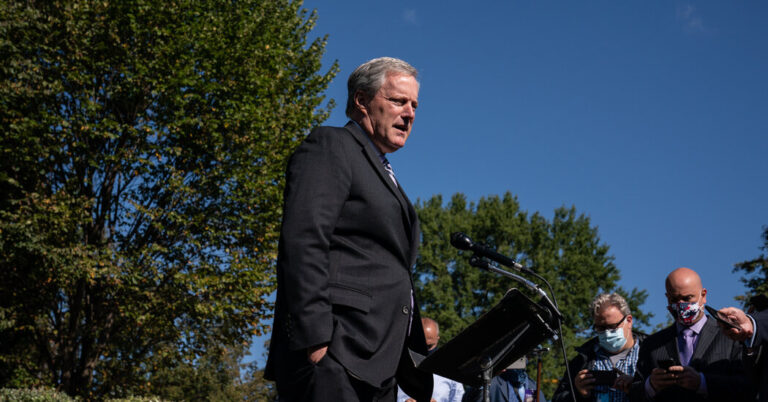Trump’s Long Fascination With Genes and Bloodlines Gets New Scrutiny
In 2020, President Donald J. Trump gave a campaign speech in Minnesota railing against refugees and criticizing protests for racial justice. Toward the end, he wrapped up with standard lines from his stump speech and praise for the state’s pioneer lineage.
Then, Mr. Trump stopped to address his crowd of Minnesota supporters with an aside seeming to invoke a theory of genetic superiority.
“You have good genes, you know that, right? You have good genes. A lot of it is about the genes, isn’t it, don’t you believe?” Mr. Trump told the audience. “The racehorse theory, you think we’re so different? You have good genes in Minnesota.”
Mr. Trump’s mention of the racehorse theory — the idea adapted from horse breeding that good bloodlines produce superior offspring — reflected a focus on bloodlines and genetics that Mr. Trump has had for decades, and one that has received renewed attention and scrutiny in his third bid for president.
In recent months, Mr. Trump has drawn widespread criticism for asserting that undocumented immigrants are “poisoning the blood of our country,” a phrase that he said first in a right-wing media interview and has in the last week repeated on the campaign trail.
As with the speech in 2020, Mr. Trump’s remarks have been criticized by historians, Jewish groups and liberals, who said his language recalled the ideology of eugenics promulgated by Nazis in Germany and white supremacists in America.
In a radio interview on Friday, Mr. Trump again defended his use of the phrase “poisoning the blood.” He dismissed criticism that his language echoed Nazi ideology by saying he was “not a student of Hitler” and that his statement used “blood” in crucially different ways, though he did not elaborate.
But much as news articles, biographers and books about his presidency have documented Mr. Trump’s long interest in Adolf Hitler, they have also shown that Mr. Trump has frequently turned to the language of genetics as he discusses the superiority of himself and others.
Mr. Trump was talking publicly about his belief that genetics determined a person’s success in life as early as 1988, when he told Oprah Winfrey that a person had “to have the right genes” in order to achieve great fortune.
He would connect those views to the racehorse theory in a CNN interview with Larry King in 2007.
“You can absolutely be taught things. Absolutely. You can get a lot better,” Mr. Trump told Mr. King. “But there is something. You know, the racehorse theory, there is something to the genes. And I mean, when I say something, I mean a lot.”
Three years later, he would tell CNN that he was a “gene believer,” explaining that “when you connect two racehorses, you usually end up with a fast horse” and likening his “gene pool” to that of successful thoroughbreds.
Michael D’Antonio, who wrote a biography of Mr. Trump in 2015, has credited this view to Mr. Trump’s father. Mr. D’Antonio told PBS’s “Frontline” in a 2017 documentary that members of the Trump family believed that “there are superior people, and that if you put together the genes of a superior woman and a superior man, you get a superior offspring.”
In 2019, Mr. D’Antonio told The New York Times that Mr. Trump had said that a person’s genes at birth were a determining factor in their future, more so than anything they learned later.
The former president has not just promoted his own “good genes,” but has repeatedly lauded those of British business leaders, Christian evangelical leaders, a top campaign adviser and the American industrialist Henry Ford.
A Trump campaign spokesman, Steven Cheung, said in a statement that Mr. Trump in his radio interview had “reiterated he is talking about criminals and terrorists who cross the border illegally.”
Mr. Cheung added, “Only the media is obsessed with racial genetics and bloodlines, and given safe haven for disgusting and vile anti-Semitic rhetoric to be spewed through their outlets.”
Mr. Trump’s political career and rise to the presidency are inextricably linked to anti-immigrant rhetoric, and his tone has only grown more severe in his third run for office.
In Friday’s radio interview, the conservative commentator Hugh Hewitt asked Mr. Trump to explain his use of the phrase, pressing him multiple times to respond to those who were outraged that the phrase resembled statements made by Hitler in his hate-filled manifesto, “Mein Kampf.”
The former president said he had no racist intentions behind the statement. Then, he added, “I know nothing about Hitler. I’m not a student of Hitler. I never read his works.”
Mr. Trump has long had a documented interest in Hitler. A table by his bed once had a copy of Hitler speeches called “My New Order,” a gift from a friend that Ivana Trump, his first wife, said she had seen him occasionally leafing through.
He once asked his White House chief of staff why he lacked generals like those who reported to Hitler, calling those military leaders “totally loyal” to the Nazi dictator, according to a book on the Trump presidency by Peter Baker, a New York Times reporter, and Susan Glasser.
On another occasion, he told the same aide that “well, Hitler did a lot of good things,” according to Michael C. Bender, a journalist who is now a New York Times reporter, in a 2021 book about Mr. Trump.
The former president has denied making both comments. On Friday, he continued his defense by pointing out that his phrase — “poisoning the blood” — differed from passages in “Mein Kampf” in which Hitler uses “poison” and “blood” to lay out his views on how outsiders were ruining Aryan racial purity.
“They say that he said something about blood,” Mr. Trump said. “He didn’t say it the way I said it, either. By the way, it’s a very different kind of a statement.” He did not explain the distinction.
In “Mein Kampf,” Hitler wrote that great civilizations declined “because the originally creative race died out, as a result of contamination of the blood.” At one point, Hitler links “the poison which has invaded the national body” to an “influx of foreign blood.”
Mr. Trump told Mr. Hewitt that he used “poisoning the blood” to refer to the immigrants coming from Asia, Africa and South America — though he did not mention Europeans — who he broadly claimed were coming from prisons and mental institutions. He added that he was “not talking about a specific group,” but rather immigrants from “all over the world” who “don’t speak our language.”
Mr. Trump first directly addressed the comparisons between his remark and Hitler’s comments on Tuesday at a campaign event in Iowa, where he told hundreds of supporters that he had “never read ‘Mein Kampf.’”
The next day, the Biden campaign posted a graphic to social media that directly compared Mr. Trump to Hitler, using images of them both and listing three quotes from each of them.
Mr. Trump has also been accused by historians of echoing the language of fascist dictators, including Hitler. Last month, he described his political opponents as “vermin” that needed to be rooted out.
Sheelagh McNeill contributed research.
Check out our Latest News and Follow us at Facebook
Original Source







